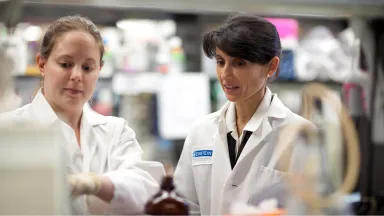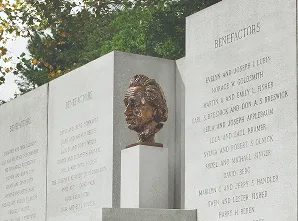
Carl L. Schildkraut, Ph.D.
- Professor, Department of Cell Biology
Area of research
- DNA REPLICATION, ALZHEIMER'S DISEASE, AGING, DNA DAMAGE TO GENES INVOLVED IN NEUROLOGICAL DEVELOPMENT, TELOMERE ROLE IN CHROMOSOME STABILITY , ,
Phone
Location
- Albert Einstein College of Medicine Jack and Pearl Resnick Campus 1300 Morris Park Avenue Chanin Building 416 Bronx, NY 10461
Research Profiles
Professional Interests
We have several exciting projects: 1. The role of DNA replication and DNA damage in aging. 2. Use of Mass Spectroscopy to identify genes for which their activity greatly decreases in aged cells. *3. Understanding the role of several genes, such as the tau protein, implicated in Alzheimer's disease. ** 4. The effect of DNA damage to genes involved in neurological development.. 5. Detecting changes in telomere replication leading to changes in telomere length and it relationship to aging.
6. We have results on the replication of alpha satellite DNA sequences that we can identify on specific chromosomes.
There would also be an opportunity to develop your own ideas.
Molecular mechanisms of DNA replication and repair teach us a great deal about aging. Replication, if performed incorrectly can give rise to genomic instability. The DNA damage response (DDR) and DNA repair play a crucial role in aging. We have developed approaches to study the replication of DNA sequences and damage.
* We have been collaborating with Dr. Simone Sidoli, Assistant Professor, Dept. of Biochemistry here at Einstein to identify these proteins by Mass Spectroscopy.
** Alzheimer's approaches cancer as a leading cause of death in the USA and affects about 50 million people worldwide. After at least three decades of intensive studies, there is currently no effective treatment and while a few factors have been implicated, it is still not clear what is the exact cause.
Selected Publications
Drosopoulos WC, Vierra DA, Kenworthy CA, Coleman RA and Schildkraut CL. (2020). Dynamic assembly and disassembly of the human DNA polymerase δ holoenzyme on the genome in vivo. Cell Reports, 30 1329-1341.e5. PMID: 32023453.
Drosopoulos WC, Deng Z, Twayana S, Kosiyatrakul ST, Vladimirova O, Lieberman PM, Schildkraut CL. 2020 TRF2 Mediates Replication Initiation within Human Telomeres to Prevent Telomere Dysfunction. Cell Rep.33:108379. doi: 10.1016/j.celrep.108379. PMID: 33176153.
Mei Y, Deng Z, Vladimirova O, Gulve N, Johnson FB, Drosopoulos WC, Schildkraut CL, Lieberman PM. (2021).TERRA G-quadruplex RNA interaction with TRF2 GAR domain is required for telomere integrity. (2021) Sci Rep. 11:3509. doi: 10.1038/s41598-021-82406-x. PMID: 33568696.
Chakraborty A, Jenjaroenpun P, Li J, McCulley A, El Hilali S, Haarer B, Hoffman EA, Belak A, Thorland A, Hehnly H, Schildkraut CL, Chen C, Kuznetsov VA, and Feng W. (2020) Replication stress induces global chromosome breakage in the Fragile X genome. Cell Reports. 32. Article 108179.
Cicconi A, Rai R, Xiong X, Broton C, Al-Hiyasat A, Hu C, Dong S, Sun W, Garbarino J, Bindra, R, Schildkraut CL, Chen Y and Chang S. (2020). Microcephalin 1/BRIT1-TRF2 interaction promotes telomere replication and repair, linking telomere dysfunction to primary microcephaly Nature Communications 11, Article number: 5861.
Pan X, Drosopoulos WC, Sethi L, Madireddy A, Schildkraut CL, Zhang D (2017) FANCM, BRCA1, and BLM cooperatively resolve the replication stress at the ALT telomeres.. Proc Natl Acad Sci U S A.:E5940-E5949. PMID: 28673972.
Madireddy, A., Kosiyatrakul, S., Boisvert, R.A., Moyano, E.H., García-Rubio, M.L., Gerhardt, J.,Vuono, E.A., Owen, N., Yan, Z., Olson, S., Aguilera, A., Howlett, N., and Schildkraut, C.L. (2016). FANCD2 facilitates replication through common fragile sites. Molecular Cell. 2016; 64(2):388-404. PMID: 27768874.
Madireddy, A., Purushothaman, P., Loosbroock, C. P., Robertson, E. S., Schildkraut, C. L., Verma, S.C. (2016). G-quadruplex-interacting compounds alter latent DNA replication and episomal persistence of KSHV. Nucleic Acids Res. 44: 3675-3694 PMID: 26837574.
Sfeir, A., Kosiyatrakul, S. T., Hockemeyer, D., MacRae, S. L., Karlseder, J., Schildkraut, C.L., and De Lange, T., Mammalian telomeres resemble fragile sites and require TRF1 for efficient replication. Cell, 138: 90-103. (2009). PMID: 19596237.
Norio, P., Schildkraut, C.L. Visualization of DNA Replication on Individual Epstein-Barr Virus Episomes. Science 294: 2361-2364 (2001). PMID: 11743204.





